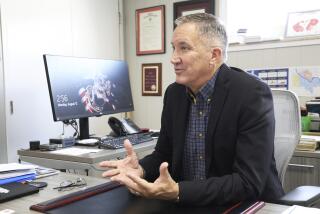Creationism again stalks the classroom

In a sane world, the ringing denunciation of intelligent design and creationist “science” delivered by a federal judge in 2005 would have eradicated these concepts from the schoolroom.
District Judge John E. Jones III of Harrisburg, Pa., ruled then that “intelligent design” is not science, “cannot uncouple itself from its creationist, and thus religious, antecedents,” and therefore is unconstitutional as a subject to be taught in a public school.
Yet the creationists keep at it. A recent report, written for Slate.com by the indefatigable and implausibly youthful Zack Kopplin, involves a network of charter schools with an enrollment of 17,000 students in Texas, Arkansas, and Indiana and an incredible haul of $82.6 million a year in state, local and federal funds.
As Kopplin reports, the biology workbook assigned to students in the schools operated by Responsive Education Solutions is shot through with creationist propaganda. Among its assertions: “Evolution — which is, after all, an unproved theory — has been treated as fact. It has reached the level of dogma, widely accepted, but unproven and changing school of thought that is treated as though it were fact.”
Its section on “The Origin of Life” asserts: “There are only two ways that life could have begun: “1 - Spontaneous generation - random chemical processes formed the first cell. 2 - Supernatural intervention created the first cell.”
As for the first living cell, the text blithers on, scientists “can only hypothesize what it might have been like.” Thus it craftily attempts to undermine the scientific method. On the other hand, it says, “for many, supernatural creation (either by God or some other supernatural power) of the first cell is a more plausible explanation.”
One way to react to a school system that places “supernatural intervention” on the same scientific plane as a natural process, however dopily described, is with relief that these 17,000 children won’t be equipped to compete in the real world with our kids. Life in modern America is hard enough, so there’s something Darwinian indeed about saddling all those kids with the burden of a 16th-century education.
Another way is to express dismay that taxpayer funds, including money paid by federal taxpayers, is going to this sort of effort.
In a reply to the Slate article posted in the Arkansas Times, Responsive Education Chief Executive Chuck Cook maintained that “the curriculum was simply providing examples of competing theories on the origin of life.” He states, “Our science curriculum does examine all sides of the scientific evidence relating to the theory of evolution — both for and against — just as we are required to do by the Texas Essential Knowledge and Skills for Biology.”
Jones took the measure of this “we’re only teaching both sides” attack on evolution. In the case before him, a disclaimer read to school pupils in Dover, Pa., at the outset of their study of evolution, “while encouraging students to keep an open mind and explore alternatives to evolution ... offers no scientific alternative; instead, the only alternative offered is an inherently religious one.”
Same here: The choice offered the schools’ students is between evolution, which is chock full of uncertainties according to the text, or the supernatural.
Textbook publishers and responsible parents have finally started pushing back against Texas textbook standards, which because of the state’s economic heft threatened to spread unscientific pap throughout the biology curricula of public schools nationwide.
Just last November, the Texas Board of Education approved high school texts from 14 publishers that had refused to water down their treatment of evolution. “None of those textbooks call into question the overwhelming evidence supporting evolution and climate change science,” the watchdog group Texas Freedom Network reported.
But as the charter school case shows, creationism still has a way of sneaking in the back door. It’s still not safe for parents to let down their guard. And it’s high time that federal education officials took a closer look at what’s being done with our money.
More to Read
Sign up for Essential California
The most important California stories and recommendations in your inbox every morning.
You may occasionally receive promotional content from the Los Angeles Times.











